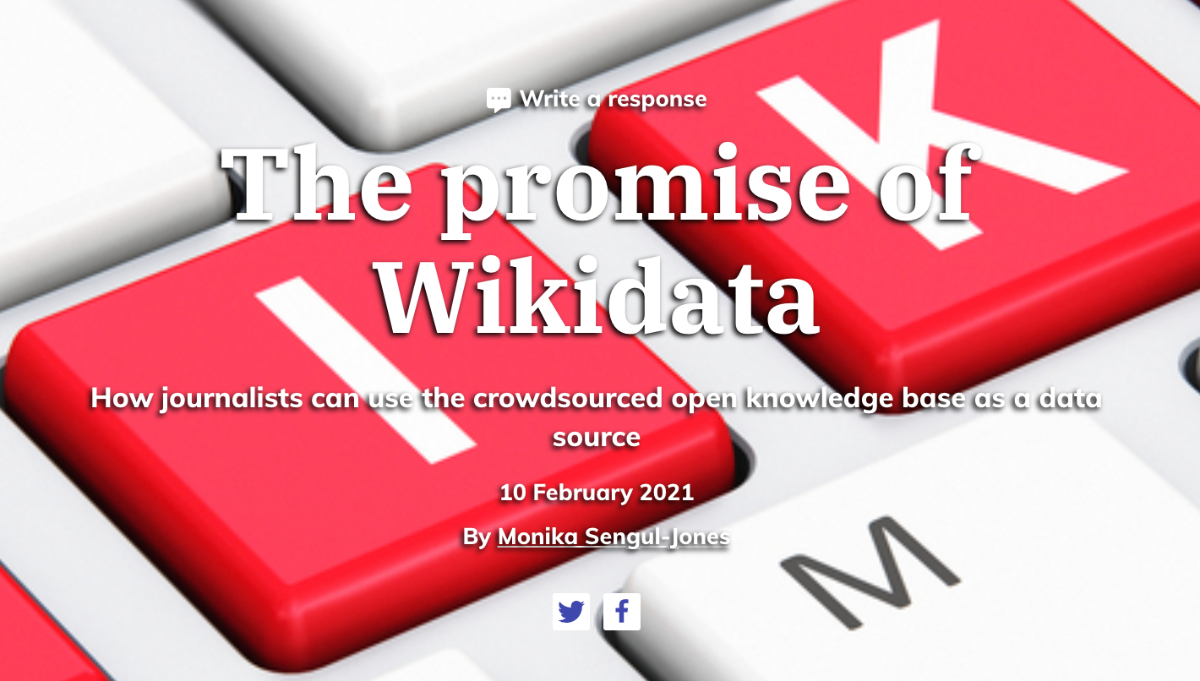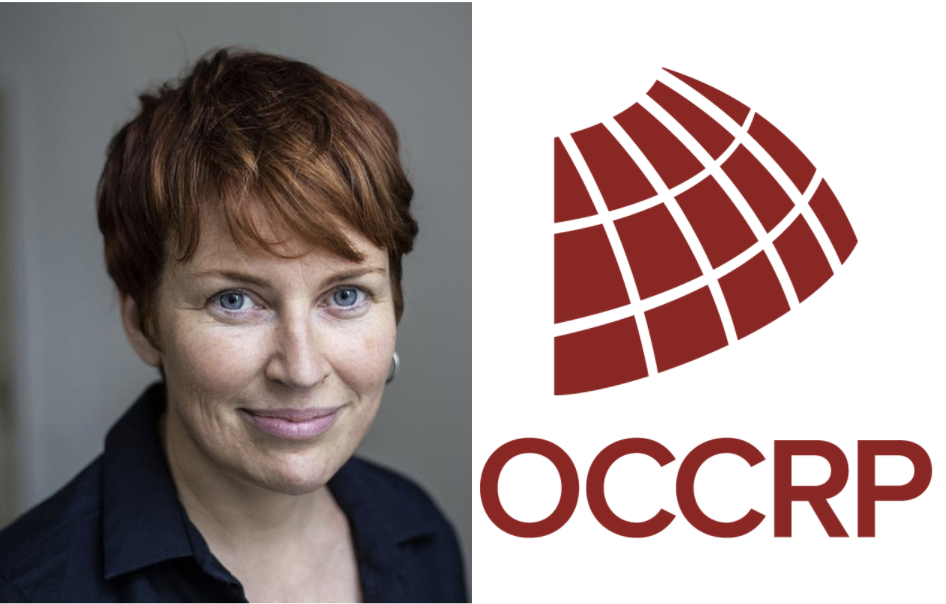What's on at #NICAR21
Conversations with Data: #68
Do you want to receive Conversations with Data? Subscribe

Welcome to our latest Conversations with Data newsletter.
With NICAR 2021 conference just around the corner, we caught up with Investigative Reporters and Editors interim executive director Denise Malan in our latest Conversations with Data podcast. She tells us all about the upcoming programme for one of data journalism's most sought after events happening next month. She also provides some useful advice for journalists new to data and how to take your first step in the field.
You can listen to the entire podcast on Apple Podcasts, Google Podcasts, Spotify, or SoundCloud. Alternatively, read the edited Q&A with Denise Malan below.
What we asked
Tell us about your work at IRE and your background in data journalism.
My background is in newspapers and doing data journalism. I joined IRE (Investigative Reporters & Editors) in 2013 and have had a variety of roles there. I am currently the interim executive director while we're in a leadership transition searching for a new executive director. My regular role now for about the past year has been as the deputy executive director.
We host 80-90 events a year, including our conferences, workshops, in-house custom training and bootcamps. I lead the training team that puts on all of those events. I also ensure our curriculum and our content is strong and evolving and that we're keeping up with the needs of journalists.

What is NICAR and how did it begin?
NICAR stands for the National Institute for Computer-Assisted Reporting, which is the data journalism wing of IRE. NICAR, as a conference, started in 1993. So we've been going for almost 30 years now, bringing the data journalism community together and helping them train each other. It used to be just a couple hundred journalists and then it really started growing in 2013. By 2018 we had over 1200 journalists at NICAR in Chicago. The real trademark of NICAR is hands-on data skills training where you can come into our computer labs and get to learn from expert data journalists.
What is on the agenda at NICAR 2021?
The NICAR 2021 conference will be held on 3-5 March 2021. For the first time ever, we will be virtual with almost 170 sessions on the agenda. That includes over 80 live sessions, which will be panels, tool demos, networking sessions, and a few happy hour sessions. We will have some meditation sessions and a DJ. We're also going to have one of the most anticipated sessions every year -- lightning talks. These are quick, quirky and fun 5-minute presentations that are submitted and then voted on by attendees. We will have 10 of them this year.
To adapt to the virtual world, our data sessions will be in virtual hands-on labs that include almost 90 recorded tutorials covering data journalism. Topics include spreadsheets, data wrangling, python and web scraping. Each lab also includes information on how to set up your home computer, since everyone will be doing this from home and it includes all the data files that you'll need to follow along with the tutorials. All of the live sessions will be recorded and you'll have access for a year to all of those sessions.

Who is eligible to attend NICAR 2021?
We require IRE membership to attend all of our conferences. For those requirements, you need to be a working journalist or a freelancer -- anyone who's substantially engaged in journalism. You can also be a journalism educator or student. We have several tiers of membership. Event registration is $175 for professionals and educators. The EarlyBird deadline registration fee was $125, but that has now passed. Students can register at any time for $50. Fellowships are still available to help journalists attend the virtual event.
What data journalism services do IRE offer for journalists?
IRE has a data services desk run by our trainers. We can help you clean data, analyse it and visualise it. We have a number of different skills in our team that can help with all of those. We do giant web scraping projects, which involve converting PDFs and cleaning the data. This is especially useful for journalists who don't necessarily have those kinds of skills in-house. These are done for an hourly fee that's on a sliding scale depending on the size of your organisation. If you are in a small organisation, it is very affordable. To find out more, visit IRE's website.
Are the terms "NICAR" and "computer-assisted reporting" still relevant today?
The National Institute for Computer-Assisted Reporting (NICAR) -- that name came up in the 90s. That's what we used computers for -- data journalism at that time. It looked very different in 1993 than it does today. Our trainings were also named computer-assisted reporting bootcamps up until just a couple of years ago when we decided to rename them to data journalism bootcamps. But the name computer-assisted reporting still sticks around and it's nostalgic for a lot of people. Of course, we use computers for basically all reporting now. But whatever you call it -- data journalism, data-driven journalism, computational journalism -- it all falls under this umbrella of what we do at NICAR.

Journalists, students and educators of colour; women who are early-career or students; and educators who teach data or investigative reporting are eligible for fellowships to help offset the cost of #NICAR21 registration. Apply today.
You've worked at IRE and as a data reporter for a newspaper. How did you get your start in data journalism?
Most of my career was at Corpus-Christi Caller-Times in Texas. We did a lot of data-driven work and we worked really hard to train our entire newsroom in spreadsheets. This is actually how I became involved with IRE. My bosses sent me to an IRE bootcamp where I learnt the real way to do spreadsheets. I had been mostly self-taught prior to that. The training took me really far in my career. And now I've been teaching those bootcamps for the last seven to eight years.
Where should journalists start when they are new to data?
At IRE we meet a lot of new data journalists and the advice that we like to give them is to start small. It can be very overwhelming when you want to learn data journalism -- you're looking at all of these different tools and you may think you need to become a mega programmer. I tell people you don't have to do all that, just take a breath and start with what you need. And in a lot of cases, spreadsheets can take you really far and you can learn those in just a few hours.
So my advice is to start with something that really interests you and your community. When you run into a challenge that you really do need to overcome, you approach it in small steps. If you need to visualise data, then you learn a visualisation tool. If you need to scrape a website, then you learn a little programming. Just don't think that you have to learn it all or all of it at once.
The other advice I have is to read data journalism constantly. Get to know the people who are doing this really well. Go to all of the trainings that you possibly can and really try to absorb the knowledge from our data journalism community.
Finally, what are some of the most inspiring data-led pieces you've come across recently?
The New York Times and The Atlantic covid tracking projects have been just an incredible public service over the last year because they are collecting data and standardising it and making it available to the public and to journalists.
Latest from DataJournalism.com
Wikidata can be a useful resource for journalists digging for data on a deadline. Monika Sengul-Jones explains the joy and perils of using the searchable data trove for your next story. Read the long read article here.

The latest edition of the Verification Handbook is available in German. A big thanks to Landesanstalt für Medien NRW and Marcus Engert of Buzzfeed Germany for making it possible. The handbook is edited by Craig Silverman, published by European Journalism Centre and supported by the Craig Newmark Philanthropies. You can also download the PDF version in English, Arabic, Turkish and Italian.

Our next conversation
Our next Conversations with Data podcast will feature investigative journalist Pavla Holcová from OCCRP. She is a regional editor for Central Europe and is founder of independent outlet investigace.cz. Pavla has contributed to major cross-border projects such as the Panama Papers, the Paradise Papers, the Russian Laundromat, and the Azerbaijani Laundromat.
She will talk to us about using data and digital forensics techniques to investigate the February 2018 murder of her colleague Slovak investigative journalist Ján Kuciak and his fiancee.

As always, don’t forget to let us know what you’d like us to feature in our future editions. You can also read all of our past editions here. You can also subscribe to this newsletter here.
Onwards!
Tara from the EJC Data team,
bringing you DataJournalism.com, supported by Google News Initiative.
P.S. Are you interested in supporting this newsletter as well? Get in touch to discuss sponsorship opportunities.
Time to have your say

Sign up for our Conversations with Data newsletter
Join 10.000 data journalism enthusiasts and receive a bi-weekly newsletter or access our newsletter archive here.
Almost there...
If you experience any other problems, feel free to contact us at [email protected]